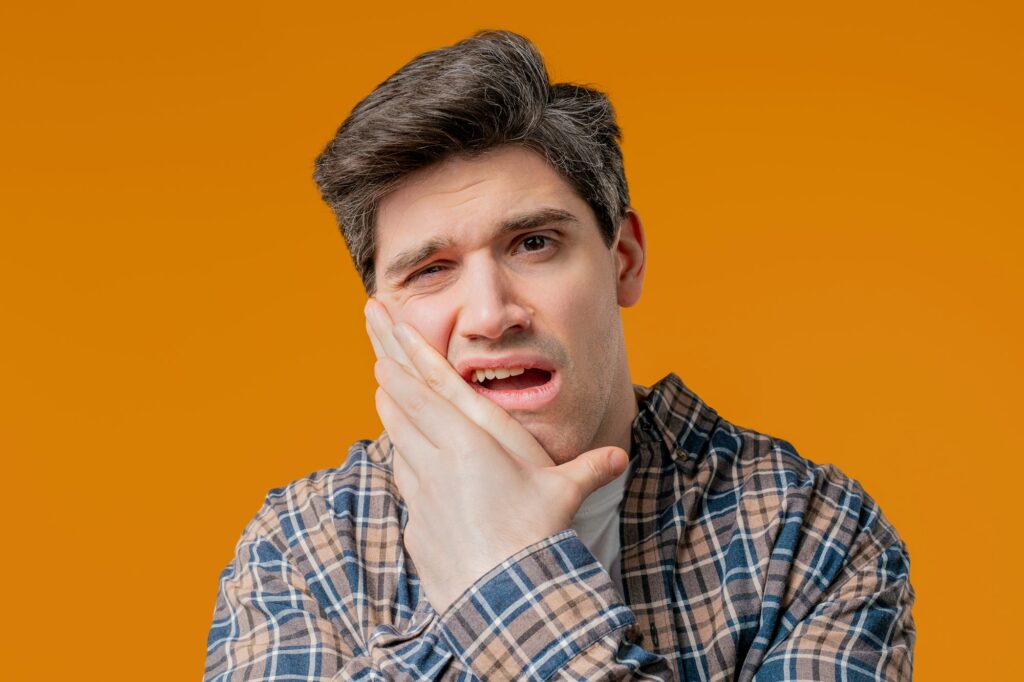Most people think of an overbite as a purely cosmetic issue, but the truth is that dental alignment has a profound effect on your breathing, airway health, and even sleep quality. One of the most overlooked causes of obstructive sleep apnea (OSA) is jaw positioning, especially a pronounced overbite.
At Houston Sleep Associates, we frequently see patients with breathing issues that stem from dental structures. Understanding how your bite affects your breathing can help you address hidden causes of fatigue, snoring, and sleep apnea.
Can Overbite Cause Sleep Apnea?
Yes—a severe overbite can contribute to or worsen sleep apnea. Here's how:
- An overbite causes the upper jaw to protrude and the lower jaw to retract.
- This backward positioning of the lower jaw can compress the airway, especially when lying down.
- A smaller airway increases the likelihood of airflow obstruction during sleep, resulting in apneic events (pauses in breathing).

If you've been diagnosed with sleep apnea or are experiencing symptoms like chronic fatigue, loud snoring, or gasping at night, your bite could be playing a role.
How Your Overbite Affects Breathing
Breathing properly requires a clear, unobstructed airway. When the jaw alignment is off, especially in the case of an overbite, it can create a narrow, high-resistance airway. This makes it more difficult to:
- Inhale fully through the nose
- Breathe deeply and rhythmically during sleep
- Maintain adequate oxygen flow to the brain
Over time, this can lead to poor sleep quality, low energy, and even long-term health issues.
Overbites and Breathing
An overbite doesn’t just affect how your teeth line up—it also influences your overall oral and nasal breathing mechanics.
Mouth Breathing
People with overbites often breathe through their mouths, especially at night. This happens because the jaw and tongue don’t sit in a position that supports easy nasal breathing. Mouth breathing can:
- Dry out the mouth and throat
- Increase the risk of snoring
- Cause or worsen sleep apnea
- Lead to bad breath and gum disease
Respiratory Conditions
Restricted airways caused by an overbite can aggravate existing respiratory conditions, such as:
- Asthma
- Allergies
- Sinus congestion
When your body is already struggling to breathe, any structural obstruction exacerbates the issue, especially during sleep.
Tongue Position
Overbites often force the tongue to sit lower in the mouth. This reduces the support the tongue provides for the upper airway, making it more likely to fall back during sleep and obstruct airflow. This is a major contributor to obstructive sleep apnea.
Orthodontic Appliances for Sleep Apnea
If you’re suffering from sleep apnea due to an overbite, treatment may include orthodontic appliances designed to improve jaw positioning and airway function.
Custom-made oral appliances gently shift the lower jaw forward during sleep, opening the airway and reducing apneic events. These appliances are:
- Non-invasive and CPAP-free
- Comfortable to wear nightly
- Proven effective for mild to moderate OSA
Signs of Obstructive Sleep Apnea
You might be dealing with OSA if you:
- Snore loudly or wake up gasping for air
- Wake up with a dry mouth or sore throat
- Feel groggy despite 7–8 hours of sleep
- Experience brain fog, irritability, or poor focus
- Have a partner who notices breathing pauses at night
How to Treat Your Overbite
Treating your overbite may be the key to resolving breathing problems and sleep disturbances. Options may include:
- Braces or clear aligners to correct jaw alignment
- Myofunctional therapy to improve tongue posture and breathing habits
- Oral appliance therapy to manage sleep apnea non-surgically
- In rare cases, orthognathic surgery may be needed for severe cases
At Houston Sleep Associates, we collaborate with orthodontists, sleep specialists, and airway-focused dentists to design comprehensive treatment plans that address both bite issues and airway function.
Can Sleep Apnea Be Reversed?
For many patients, yes, sleep apnea symptoms can be significantly reduced or even reversed with the right treatment plan. Addressing underlying causes, such as an overbite, excess weight, or poor sleep habits, can dramatically improve your sleep and overall health.
The earlier you intervene, the better your chances of avoiding long-term complications like:
- Cardiovascular disease
- Diabetes
- Cognitive decline
- Depression and anxiety
💤 Sleep Better by Treating the Root Cause
If you suspect your bite may be affecting your sleep or breathing, don’t wait. At Houston Sleep Associates, we’ll help you uncover the connection between your overbite and your sleep health—and offer practical, personalized solutions.

